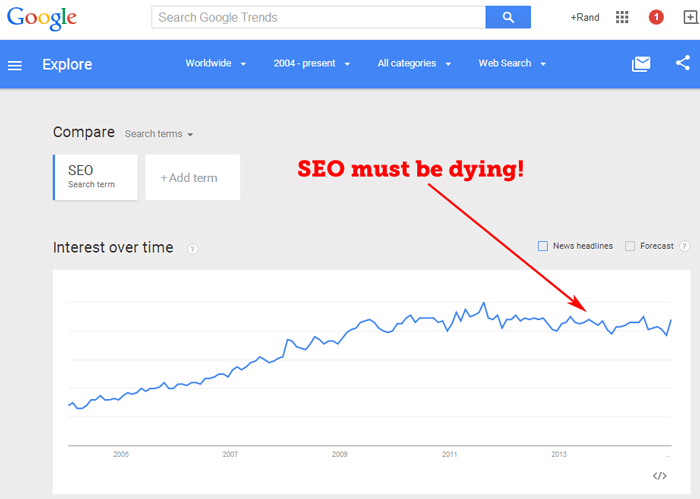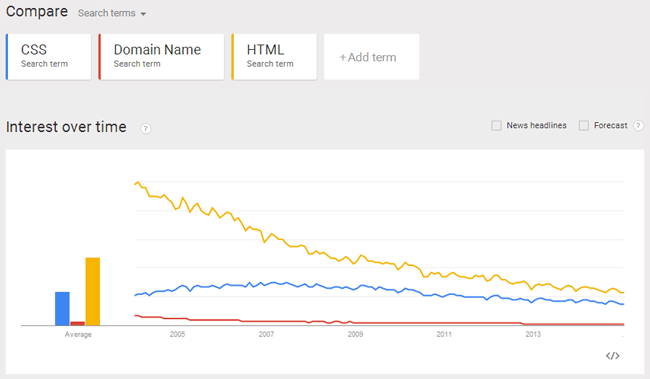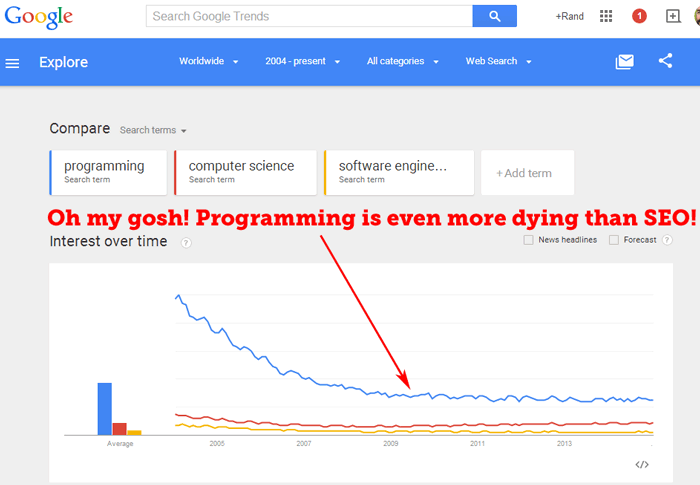Sigh… Every few years, there’s a renewed effort in the worlds of shoddy journalism, clickbait, and cheap pageviews to claim the death of SEO. Recently, a few articles, a handful of folks on Twitter, and some presentations I’ve come across have been using this chart to PROVE that this time, SEO really is dying:

Google Trends Search for “SEO”
See how there’s a slight downward trend from the middle of 2012 to today? Our doom must be at hand!
Those of us in the search world know that Google Trends isn’t particular accurate or precise, but even as a harsh critic of the data, I’d agree that at least broadly, on search terms with very large amounts of volume (thousands of searches each month or more), the trendlines are rarely outright lies. That being the case, isn’t this graph showing a decline in the interest around SEO? And if that’s what’s being shown, isn’t there at least a little merit to the idea that SEO is on a downward trajectory?
Nope. No. And more no. Let’s walk through some analogous search trends to show why and what’s really going on.
Here’s a Google Trends look at the search volume for CSS, Domain Names, and HTML:

Google Trends Search for “CSS,” “Domain Name,” and “HTML”
Apparently, CSS is dying, domain names are dying, and HTML is, you guessed it, dying.
But, maybe, you think, those terms are being replaced by alternatives and it’s not the concepts or practices themselves that are dying, but rather that particular language usage. That’s possible, but in all the searches I tried in Google Trends, these appear to still be the dominant wordings searchers use to seek out these topics.
Let me offer an alternative — when CSS was relatively unknown, it garnered lots of searches, and as it became more ingrained, standardized, and accepted as a basic part of web development, it ceased to garner as much search volume. That’s not because it isn’t still in use (in fact, more sites and pages use CSS today than ever did in 2005, when the query “CSS” had much greater search volume), but because few people still need to perform this most basic of searches on the subject. Most everyone who needs to know about CSS knows at least enough that they aren’t searching Google for those three letters.
I believe the same thing is happening in domain names, in HTML, and in SEO.
SEO has reached a stage of greater maturity, and while there are still many, many people being introduced to the subject each day (and, often, turning to Google to learn more about it), there are fewer people having their first-time-exposure to the acronym, and thus, fewer who need to search for it. SEO professionals certainly don’t search for SEO regularly, just as web development professionals don’t search for HTML or CSS regularly. Most experienced domain name buyers already know where to buy domain names – it’s only those new to the purchase or wanting to switch providers/re-explore the field conducting those queries.
My hope is that, before we assign a storyline to a search query trend like those who’ve used the chart above as “proof” that SEO is dying have, let’s be thoughtful and holistic in considering what could account for the slope of that line. Just imagine if we used this chart below to claim that programming was dying:

Google Trends Search for “Programming,” “Computer Science,” and “Software Engineering”
I’d bet many of the same people who are certain that SEO is on its deathbed would be cleverly establishing all kinds of storylines to explain why the Google Trends chart isn’t proving the death of programming 🙂
p.s. Credit to Serbay Arda Ayzit in the comments below for also pointing out that Google Trends data is always shown as a percentage of Google searches, not merely as a raw quantity. Thus, it’s possible that SEO has continued to grow rapidly as a search term, but Google’s overall number of searches has grown even faster, thus making the trendline appear to flatten/slightly decline.
